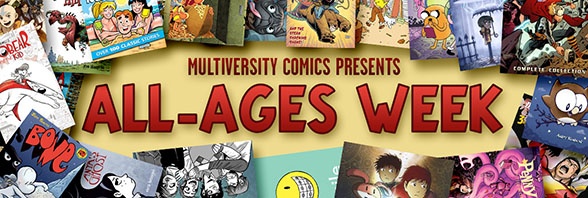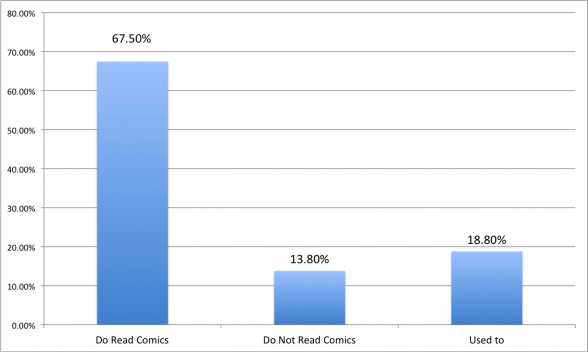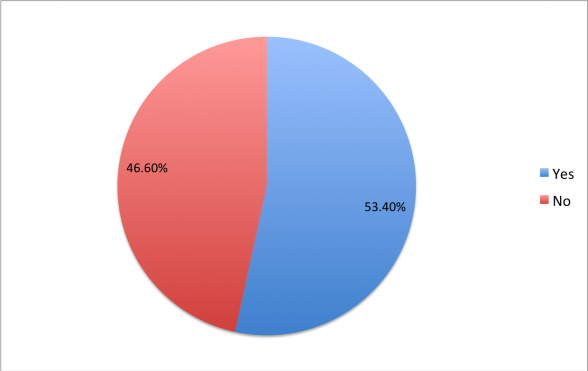
When it comes to younger readers, sometimes the biggest roadblock to them becoming a fan of comics isn’t a lack of interest or anything like that. Even if a child is interested in reading comics, they may not be able to do so if their parents aren’t invested in the idea, and many parents still subscribe to the idea that comics aren’t something for kids, but rather stories for adults that are filled with scantily glad women and overly violent battles. How can kids become fans of comics if that’s what parents’ think of them?
But is that how parents really feel? Or are those just the thoughts of a vocal minority? That’s something we wanted an answer to, so a 20 question survey for parents was put together to try and uncover the truth, and to hopefully gather further details as to what the current perception of comics is. In the process, 91 respondents filled out the survey and help build something of a consensus along the way, both through qualitative and quantitative questions.
Let’s take a look at the survey results below.
Note: all participants were gathered through social media posts (through personal accounts, not Multiversity’s, to attempt to minimize those predisposed to liking comics), through friend networks of parents, and thanks to the help of kind folks like Jack Baur of the Berkeley Public Library system and Zach Rosenberg of parent blog 8BitDad.
The Participant Profile
Before we jump into the results, we wanted to give a quick bit of insight into the people that responded, in an attempt to show the diversity (or lack thereof) of participants to this endeavor.

The pie chart above shows off the ages of respondents, as the vast majority of participants – a little under 80% – were between the ages of 25 and 44. Of those participants, the majority were from various sections of the United States, most notably the Western part of the country, with a small portion of them coming from the United Kingdom and Canada.

Nearly 90% of participants either had one or two children, with 3 and 4+ children only representing a combined 13.4% of all participants. The gender mix for their children was pretty evenly distributed between boys and girls, with ages ranging from newborns to 33 years old. The majority of respondents had children in-between 4 and 10 years old.

Perhaps the most surprising response of the entire survey was this chart, as nearly 70% of respondents said they do in fact read comics. Granted, comics are a widely defined medium at this point, with webcomics like The Oatmeal and XKCD vastly expanding the reach to audiences that mostly do not label themselves as comic readers. It is worth noting the likelihood that the people who were more inclined to respond were those who already had an interest in the subject, driving this number up.
The Survey
Now that we’re through identifying the “who”, it’s time to dig into the meat of the survey and figure out what everyone thinks of comics and what the perception is of the medium as reading material for their kids.

The first question asked for this section was a simple one: what ages do you think comics are for? The question was split into four age levels – 12 and under, 13 to 18, 19 to 35, and 35+ – and they were allowed to choose as many as the thought fit (there was no all-ages option). Surprisingly, especially given the high level of readership from the participants, the lowest percentage of respondents thought comics were for adults. In fact, the highest percentage believe that comics are for teenagers in specific, as nearly 94% of respondents selected that age group as being appropriate readers of comics.

The next question tackled a big one: are kids interested in reading comics? Or more specifically, have they displayed interest in reading comics? The answer to this was a resounding yes, as more than three quarters of respondents said that their kids have shown interest in comics. This is hugely important, as for comics as a medium to grow and to continue on past the existing readership, it will need new readers. If this cross section of parents is to be believed – and this is undoubtedly a small sample size – kids are interested in reading comics and graphic novels.
Continued belowAnd that, my friends, is good news.

Not only that, but the response from parents as to whether or not they view comics as something suitable for their kids to read was even more encouraging. The response was almost universally positive, as more than 97% of those who answered viewed comics as something they would be okay with their kids reading, with several participants abstaining. For this question, participants were asked to elaborate as to why they answered how they did, and those answers were even more hopeful.
Maureen Krantz from California shared, “My oldest child learned to read due to graphic novels!” Samuel Williams from England echoed that sentiment, saying, “I believe that comics are a great way for children to learn to read and learn about storytelling. They encourage creativity in children and can be really fun.”
The aforementioned Zach Rosenberg, who is from California, said, “as my son learns how to read, comic books offer him colorful pictures, characters he cares about, and sometimes, shorter sound-type words like ‘BOOM’ or ‘POOF’ that he can sound out and be proud about reading.” Those who elaborated on their answers repeated both the idea that it gives their kids pride to be able to read them, and that comics have the ability to help kids learn to read through words and pictures.
Another respondent who declined to share their name and location, had an even more exciting response, as they said, “We (the parents) choose carefully which comics she reads. She has taken to the comic form and has made a lot of her own comics already.” Not only is their daughter reading comics, but she’s actively making her own due to her excitement from reading them. A future creator of tomorrow!
There weren’t a lot of negative responses, but one shared that they want their child reading more chapter books rather than picture books, which is a frequently mentioned roadblock for parents. One other respondent shared “I don’t want them turning into democrats,” which is definitely not something that came up often this week.
In a follow up question, respondents were asked what specifically appeals to them about comics as a reading choice for their children, and the responses were very diverse.
Don Brackett from Ontario, Canada shared that he actively encourages his kids to read things of all different varieties. “I want them to read as many types of material as possible. Comics inspire imagination. Comics inspire artists as well, not just reading. There is an ocean of creativity being expressed that I want them to see and experience.”
Continuing on with that thought, a respondent who declined to include their name shared that, “images and words have different capacities for communication, and together, they can do some really interesting things.”
Two great answers came from two highly disparate sources, though. The first is from Arthur Wyatt, a comic writer who does a lot of work for 2000AD shared, “I feel like it’s something we can share. Also the eldest kid is dyslexic and has particular problems with reading stamina so anything she will voluntarily read for a length of time on her own is a wonder.” Aniela Humphries from Alaska mirrored that answer and said her kids are “eager to read them. For hours.”
Those answers matched a lot of the sentiment from respondents, and was one of the most encouraging attributes. Parents love comics because their kids love reading comics, and whether its someone who struggles with reading stamina or someone who just isn’t that interested in reading in general, anything that they choose to read on their own time is something that is welcome in homes.
Comics, of course, aren’t universally perfect reading material for kids (just like any other type of book), and that’s something even the staunchest supporters of the medium can agree to. There are still roadblocks to unleashing their children as comic book readers, and respondents were asked to share the biggest ones.

Now the vast majority of them still said they’d be fine with their kids reading comics. However, many parents still have concerns when it comes to comics. By far, the biggest is the content within them. Almost 42% of respondents selected that answer, with respondents circling two main issues: violence and the overt sexualization of women.
Continued belowMinta Montalbo from Alaska said that the “ridiculous sexualization of female heroines gives me pause,” while Deb Thompson from California wants “less violence and graphic sexual violence towards woman.” Kara Ridenour from Alaska agrees with both of them, sharing she’s fine with her son reading them, but “I just want to make sure the comics my son reads are not too scary nor have naked women.”
Another frequently mentioned issue was the cost of reading comics on a monthly basis. Paul Richardson from the United Kingdom said “I’d love my daughter to grow up with a love for comic books, like I have, but the current cost of mainstream floppies is a barrier.”
Jimmy Ettele from Illinois matched that idea, but elaborated on the issue of content as well. “I’m fine with them reading (comics) but the stories, once geared towards a younger demographic, are now more centric to my age bracket. And they are ridiculously expensive.”
Respondents were also asked as to what they would change about comics to make them more appropriate for their children to read, and the answers were reemphasized some of the previously stated issues parents had with the medium.
Paul Harrison-Davies from the United Kingdom hit on the poor handling of women characters, as he said there are “still too many female superheroes in revealing clothes.” He also added a really interesting thought, as he said, “Famous characters (are) no long child appropriate.” Forrest Helvie shared that belief as well, saying, “my kids would kill for some Batman comics, but there are so few titles that are okay for them to read at 3 & 5.”
That angle was one that matched the thoughts of varying experts featured throughout All-Ages Week. Characters of interest like Batman, Superman, Wolverine and Captain America are featured almost exclusively in comics that are too dark and violent for younger readers, giving children no avenue to read stories about their favorite heroes.
Another respondent expanded on the the way most everyone that isn’t just your average hero, and how non white male characters are poorly handled. “I’m especially concerned about violence in comics, as well as misogyny, heteronormative biases, other gender stereotypes, sexual content, an overemphasis on heroism, and general bad values.” Forrest Helvie from Connecticut agreed, saying he’d like to see “great inclusivity and diversity in the mainstream. Non-mainstream is really doing some fine work in this regard. Let my kids see OTHER groups of people represented.”
Cost was reemphasized as well, as Drew from Indiana shared “comics aimed at my children cost as much and are produced at the same quality as comics aimed at me. Lower cost + lower quality materials = my kids get more.” Paul Richardson from the United Kingdom certainly agrees, as he wants “cheaper, more entry level stories that are more easily available. Maybe something like Comixology but aimed at all ages?”
The biggest point of emphasis though? Parents simply want more comics made for their kids.
Richardson wants “many, many more all ages titles! Too many are aimed at teen boys.” Another respondent said they want “more people writing comics that are for kids…the main series our daughter gets to read is ‘Owly’. We occasionally find other little zines she can read. There aren’t a whole lot of other options.”
Cartoonist Jake Wyatt had my favorite answers, though, as he also wants more comics for kids but has some interesting ideas on the subject. “More comics for kids, in long-form compilations, maybe a Shonen Jump style monthly mag for kids. Floppies are impractical for young readers.”
It was an idea he reemphasized later on as well, sharing that he believes comics should be sold “almost exclusively in graphic novel format.” That was a topic that was tackled on Tuesday, and it’s something that is hard to disagree with. For both parents and kids, comics seem to be easier to appreciate in either collected or larger volume forms. The idea of a Shonen Jump style monthly mag is enormously interesting, and one has to wonder if Viz itself has thought of creating a monthly anthology release through its Perfect Square imprint.
One question that was brought up was whether or not the shops you can buy comics at impacts parents desire for their kids to read them, and for the most part, it was a non-factor. Most have found shops or bookstores that are all-ages friendly, and have no issues at all. That said, several emphasized that some shops are not as all-ages friendly as others, and that they either have to buy the comics themselves and bring them home, or they want to go into the shop first themselves to decide if the location is suitable. Many applauded comic shops that have sections specifically aimed at kids that are away from the more adult themed materials, and openly wished that every shop would feature that.
Continued belowA big question was one of genre, and what types of comics are kids actually interested in reading, and the results were fairly predictable.

By far the two most frequently selected options were superhero comics and those that are related to movies and TV shows, which either could be tied to superheroes themselves or related to things like “Adventure Time” or “Bravest Warriors.” This is unsurprising, but also showcases one of the sad truths of comics for kids today: they are enormously interested in superhero comics, but when you look at what’s being produced today, almost none of what you see is suitable for younger readers, as we covered on Monday. Good luck explaining to your child what’s going on in Hickman’s Avengers books or the Finches’ “Wonder Woman”.
Respondents shared some very interesting alternatives to the selections, as three emphasized the awesomeness of The Phoenix, a weekly anthology comic for kids in the United Kingdom. Besides that, people wrote in about their children’s affinity for books like “Owly”, “Robot Dreams”, “Peanuts”, graphic novels based on book series like “Percy Jackson”, and more.

One modern element that is oft cited in the recent boom of comics is the explosion of comic movies and TV shows, and within the respondent pool, it wasn’t a huge driver of interest for kids reading comics. According to their parents, it’s a near dead split between it impacting them and not. With the enormous amount of TV and film content out there from Marvel, DC and others, it seemed likely that this would be hugely influential, but it appears to be otherwise.
The Final Word
To close, parents were asked to share any final thoughts, and as with the rest of the survey, some brilliant thoughts were shared.
Arthur Wyatt emphasized “despite the grimness of ‘mainstream’ comics it’s actually a great time for all ages stuff.” Another respondent agreed, sharing his daughter’s story and how she’s taking that affinity to another level. “She makes awesome comics on her own. She enjoys making comics more than reading them. She can make them to suit her own sense of humor and aesthetic. She doesn’t feel confined by comic norms and gets creative. This is a great relationship for a little kid to have with comics as a form, I think.”
Rosenberg said, “I love to bring my son to the comic store. We get to look around, and he picks out a couple of comics to buy. Then, we go home and I’ll read one to him before bed. It’s helping his future love of reading. Even when he’s being bad and has to be sent to his room to ‘think’, many times I’ll walk in when his time is up and he’ll have a couple comics on his bed that he’s looking through, trying to sound out words. Comics inspire young pre-readers to learn.”
Jake Wyatt had concerns to share, as he said, “I’m not aware of any ‘early reader’ comics for my kid. And if you get children consuming something at a young age (comics, novels, whatever) you have a lifelong reader. We’re losing because we almost ONLY target adults as comic creators, and that’s generally too late to find a new audience.”
With new audiences come new ways to engage with the medium and Bryce Hamels of Alaska had this to say. “My daughter is 3. Unless you can have interactive, age appropriate comics that can be on an tablet device I do not think she is going to be into it.”
While those two last concerns are different, they both emphasize a theme that runs throughout all of these answers: kids want to read comics, and parents want them to read them, but comics need to match its readership and where we are as a society to be a viable choice for young readers. Whether that means toning down content, producing more material for younger readers or changing the format readers can engage with comics is dependent on the child and the parent, I’m not sure, but it’s obvious to me that kids are okay with comics. It’s just uncertain how many of them are okay for kids.
To build the readership of tomorrow, those involved with comics just need to figure out how to do that. If they do, both parents and their kids will be there to read them.






